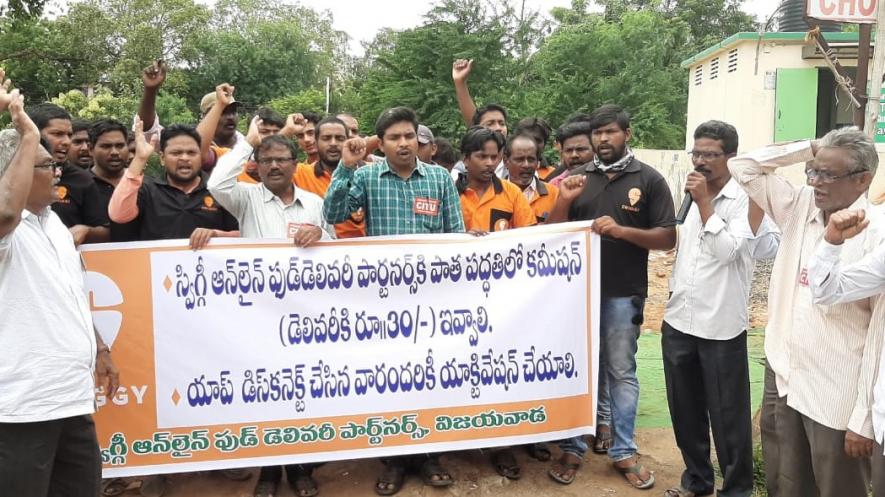Food Delivery Workers: Demand for Labour Regulation ‘Sandwiched’ Between Beef-Pork Row

New Delhi: The burying of demands on rights and benefits of food delivery workers under the ‘beef-pork’ controversy by the media is helping these apps win over a ‘liberal’ audience while making governments turn a blind eye to the working conditions in the supply chain. One such demand that has been ignored is to consider bringing the services of food delivery workers under the purview of labour regulations.
On August 9, in Andhra Pradesh’s Vijayawada, Swiggy delivery boys staged a three-day dharna to protest against the slashing of their commission by 50% by Swiggy. The demonstration was backed by the Centre of Indian Trade Unions (CITU).
Amidst the recurrent demands of fair pay structures, humane working conditions, and some social benefits, the workers also voiced their demand from the government to extend the ambit of labour laws to cover them as well.
This is about the same period, when Zomato delivery boys in Kolkata stirred up a controversy by declaring a strike against the service provider for reportedly hurting their cultural sentiments (the demand was to factor vegetarian and non-vegetarian preferences into delivery logistics). Interesting to note, while the reality of the working conditions of delivery boys was conveniently grounded, a baseless commentary was fired up to keep the moderate audience engaged in Twitter wars. Zomato seized the opportunity by marketing its yet another liberal stand and became the subject of headlines in mainstream media. However, even in this case, the question of pay structure, which was what the protest was all about initially, was not addressed by the company and a BJP leader got involved later, as reported by HuffPost, providing the protest a religious tone.
Considering the prevailing discontentment among food delivery executives, it becomes imperative to first look at the exploitative conditions under which they seem to be working.
A study was published earlier this year by the Fairwork Project, an initiative led by two Oxford University researchers, to rate and rank working conditions in platforms in the online gig economy. The parameters used to rank the companies were – pay, conditions, contracts, management and representation. As the Scroll reported, out of a total score of 10, Zomato and Swiggy both scored only four. The highest score was seven, secured by ecommerce platform Flipkart.
Over the past year, online food ordering firms have expanded their operations from just 20-30 cities to well over 500. According to some estimates, India’s online food ordering sector is growing at a 15% per quarter. However, as far as the delivery workers are concerned, the conditions have consistently deteriorated, taking 16 to 18 hours of work a day with no weekend breaks, to earn a minimum of ₹25,000 to ₹30,000 per month.
Newsclick spoke to Babu Rao, Andhra Pradesh State Secretariat member of Communist Party of India (Marxist), who was a part of the CITU-backed demonstration by Swiggy delivery boys in Vijayawada. He said it was due to the absence of any statutory obligation over these online food delivery companies that rampant exploitation of workers was possible. These companies term the delivery boys as ‘delivery partners’ instead of ‘employees’ or ‘workers’ to bypass the regulations, he added.
“Be it Employees State Insurance or ESI, provident fund or medical insurance, these workers enjoy zero social benefits…add this to the constant fear of getting deactivated by the service provider in case of any protest,” he added.
In rare cases of negotiations, the management does not speak to any of the unions but only to individual delivery boys associated with the company, as unionisation is not allowed, which translates into a disorganised representation of the rights of the delivery boys, he said.
However, when it comes to ‘Woke Marketing’ – a strategy used by brands where ‘woke’, quite funnily, refers to awareness – the brands address the ‘liberal’ audience by championing the sentiments, such as secularism and equality. The stands taken by Zomato are a textbook example – be it in the beef-pork controversy in Kolkata or in the previous one, when the company created a moment for itself on Twitter by tweeting: “Food doesn’t have a religion. It is a religion.”
While such controversies help the brands in one way, they also prove useful for the ruling state governments to look away from the genuine demands of these workers regarding labour laws. In the beef-pork controversy, it was reported that the individual leading the protest in Kolkata was closely associated with the BJP.
Thanks to the unwarranted media attention to such controversies, the material grievances of these workers have instead turned into a cultural war being waged by these apps. As a result, in this win-win for the companies and governments, it is the workers who stand to lose.
Get the latest reports & analysis with people's perspective on Protests, movements & deep analytical videos, discussions of the current affairs in your Telegram app. Subscribe to NewsClick's Telegram channel & get Real-Time updates on stories, as they get published on our website.
























